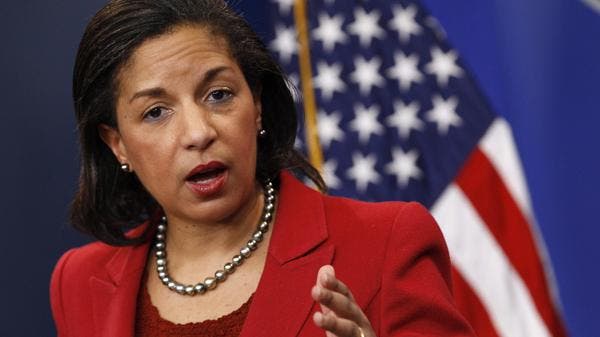Rice: strike against Syria aims to send message to Iran
 U.S. Ambassador to the United Nations Susan Rice speaks at the
White House in Washington, in this Feb. 28, 2011 file photo. (Reuters)
U.S. Ambassador to the United Nations Susan Rice speaks at the
White House in Washington, in this Feb. 28, 2011 file photo. (Reuters)
Al Arabiya
A U.S. military strike on the Syrian regime is in part aimed to
send a message to its ally Iran over its nuclear program, U.S. National
Security Advisor Susan Rice said on Monday.
Susan Rice, joining a major public effort by President Barack Obama to persuade a skeptical Congress, said the United States was morally bound to respond to Syrian President Bashar al-Assad's alleged use of chemical weapons, AFP reported.
Rice said that U.S. action on Syria was also critical for the broader influence of the United States, which has joined Israel and European nations in warning Iran against developing nuclear weapons.
"We will not allow Iran to acquire a nuclear weapon," Rice said at the New America Foundation, a think tank.
"As the president has said, all options remain on the table. For our efforts to succeed, however, the leaders in Tehran must know that the United States means what we say," she said.
"If we do not respond when Iran's close ally uses weapons of mass destruction, what message does that send to Iran? It risks suggesting that the international community cannot muster the will to act when necessary," Rice said.
But Ben Rhodes, a U.S. deputy national security advisor, told MSNBC that Washington would not, however, ease pressure on Damascus and was wary of a “stalling” exercise.
State Department spokeswoman Marie Harf said the U.S. would consider the proposal floated by the foreign ministers of Russia and Syria with “serious skepticism” because it might be a stalling tactic, according to Associated Press.
Harf said Syria had consistently refused to destroy its chemical weapons in the past.
“We’ll have to take a hard look at the Russian statement ... so we understand exactly what the Russians are proposing here,” she said.
U.S. Secretary of State John Kerry earlier said that Syrian President Bashar al-Assad could avoid a U.S. military strike by surrendering all his chemical weapons within a week.
When asked by a reporter in London whether there was anything Assad’s government could do or offer to stop a military strike, Kerry answered:
“Sure, he could turn over every single bit of his chemical weapons to the international community in the next week - turn it over, all of it without delay and allow the full and total accounting (of it), but he isn’t about to do it and it can’t be done.”
The State Department later said Kerry had been making a rhetorical argument about the impossibility of Assad turning over chemical weapons, which Assad denies his forces used in the Aug. 21 poison gas attack, according to Reuters.
Susan Rice, joining a major public effort by President Barack Obama to persuade a skeptical Congress, said the United States was morally bound to respond to Syrian President Bashar al-Assad's alleged use of chemical weapons, AFP reported.
Rice said that U.S. action on Syria was also critical for the broader influence of the United States, which has joined Israel and European nations in warning Iran against developing nuclear weapons.
"We will not allow Iran to acquire a nuclear weapon," Rice said at the New America Foundation, a think tank.
"As the president has said, all options remain on the table. For our efforts to succeed, however, the leaders in Tehran must know that the United States means what we say," she said.
"If we do not respond when Iran's close ally uses weapons of mass destruction, what message does that send to Iran? It risks suggesting that the international community cannot muster the will to act when necessary," Rice said.
Disarming Assad
Meanwhile, a U.S. official said the United States plans to “follow up” with Russia on Syrian regime’s pledge to surrender its chemical weapons stockpile to international control.But Ben Rhodes, a U.S. deputy national security advisor, told MSNBC that Washington would not, however, ease pressure on Damascus and was wary of a “stalling” exercise.
State Department spokeswoman Marie Harf said the U.S. would consider the proposal floated by the foreign ministers of Russia and Syria with “serious skepticism” because it might be a stalling tactic, according to Associated Press.
Harf said Syria had consistently refused to destroy its chemical weapons in the past.
“We’ll have to take a hard look at the Russian statement ... so we understand exactly what the Russians are proposing here,” she said.
U.S. Secretary of State John Kerry earlier said that Syrian President Bashar al-Assad could avoid a U.S. military strike by surrendering all his chemical weapons within a week.
When asked by a reporter in London whether there was anything Assad’s government could do or offer to stop a military strike, Kerry answered:
“Sure, he could turn over every single bit of his chemical weapons to the international community in the next week - turn it over, all of it without delay and allow the full and total accounting (of it), but he isn’t about to do it and it can’t be done.”
The State Department later said Kerry had been making a rhetorical argument about the impossibility of Assad turning over chemical weapons, which Assad denies his forces used in the Aug. 21 poison gas attack, according to Reuters.
Tags
Labels: Chemical Weapons, Conflict, Intervention, Iran, Nuclear Technology, Syria, United States

<< Home